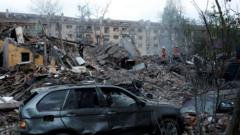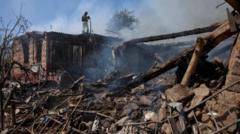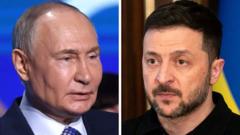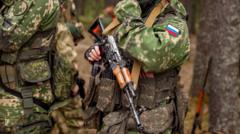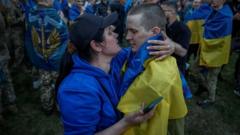In a recent twist to the ongoing pursuit of peace, ceasefire talks between Ukraine and Russia scheduled to be held in London have been downgraded. US Secretary of State Marco Rubio and special envoy Steve Witkoff will not be attending the discussions, which are now set to be led by senior officials from the UK, France, Germany, and Ukraine alongside a bilateral meeting hosted by UK Foreign Secretary David Lammy.
Ceasefire Negotiations in London Diminished as Key Figures Withdraw

Ceasefire Negotiations in London Diminished as Key Figures Withdraw
High-stakes discussions on a ceasefire between Russia and Ukraine face adjustments as U.S. Secretary of State and envoy pull out, leaving hurdles in place.
This may be significant given that Ukrainian President Volodymyr Zelensky has starkly rejected any proposal to recognize Crimea as Russian territory, despite potential concession talks emerging amidst rising speculation regarding Russia's willingness to cease its invasion along existing front lines in exchange for certain concessions. While diplomatic efforts appear to be gaining momentum, the endgame remains shrouded in uncertainty.
Following a conversation on Tuesday between Rubio and Lammy, both expressed hope for productive dialogues set against the backdrop of a "critical moment for Ukraine, Britain, and Euro-Atlantic security." However, the UK Foreign Office has confirmed that foreign ministers' talks have been postponed and are now closed to media coverage.
Meanwhile, the White House has announced that Witkoff will travel to Moscow shortly for a further engagement with Russian President Vladimir Putin. Reports from reliable sources indicate that Russia might be considering a halt to its military operations in exchange for U.S. acknowledgment of Russian sovereignty over Crimea. Yet, Zelensky firmly dismissed any such proposals, emphasizing Ukraine's non-recognition of Crimea's occupation during a Tuesday briefing.
UK defence officials have indicated no observable reduction in Russian military operations despite Putin's declaration of a temporary ceasefire aligning with the Easter weekend. UK Defence Secretary John Healey remarked that military pressure continues to be exerted on Ukraine, and confirmed that recent military progress by Russia has shown signs of slowing down.
Tragically, ongoing hostilities persist, including a deadly drone strike in the Ukrainian city of Marhanets that resulted in nine fatalities. The humanitarian impact of the conflict remains dire, with millions displaced and numerous casualties recorded since the invasion began on February 24, 2022.
The road to a lasting ceasefire is littered with setbacks, and the historical context of the conflict—dating back to Ukraine's 2014 upheaval and Russia's subsequent annexation of Crimea—complexifies peace efforts.
Following a conversation on Tuesday between Rubio and Lammy, both expressed hope for productive dialogues set against the backdrop of a "critical moment for Ukraine, Britain, and Euro-Atlantic security." However, the UK Foreign Office has confirmed that foreign ministers' talks have been postponed and are now closed to media coverage.
Meanwhile, the White House has announced that Witkoff will travel to Moscow shortly for a further engagement with Russian President Vladimir Putin. Reports from reliable sources indicate that Russia might be considering a halt to its military operations in exchange for U.S. acknowledgment of Russian sovereignty over Crimea. Yet, Zelensky firmly dismissed any such proposals, emphasizing Ukraine's non-recognition of Crimea's occupation during a Tuesday briefing.
UK defence officials have indicated no observable reduction in Russian military operations despite Putin's declaration of a temporary ceasefire aligning with the Easter weekend. UK Defence Secretary John Healey remarked that military pressure continues to be exerted on Ukraine, and confirmed that recent military progress by Russia has shown signs of slowing down.
Tragically, ongoing hostilities persist, including a deadly drone strike in the Ukrainian city of Marhanets that resulted in nine fatalities. The humanitarian impact of the conflict remains dire, with millions displaced and numerous casualties recorded since the invasion began on February 24, 2022.
The road to a lasting ceasefire is littered with setbacks, and the historical context of the conflict—dating back to Ukraine's 2014 upheaval and Russia's subsequent annexation of Crimea—complexifies peace efforts.



